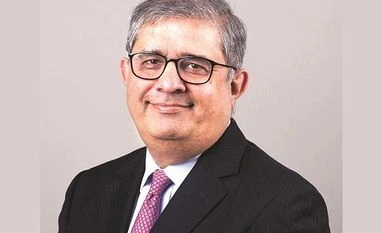We may never know for sure what Amitabh Chaudhry told his senior colleagues after having sewn up the $2-billion buyout of Citibank’s retail book in India.
In all likelihood, he would have worn a broad grin; and asked them to get behind their desks. A confirmed workaholic, Axis Bank’s boss is not known to suffer fools gladly.
“It’s not that others in his league are more indulgent, or cut slack for you. It’s just that few of us know him of having a life outside of work,” says a peer, who has known him from his early days at Bank of America (BankAm), where he was handpicked by Vikram Talwar — its longest serving country-manager (1970-1994).
Situating Chaudhry
An engineer from Birla Institute of Technology and Science (Pilani) and a postgraduate degree holder from the Indian Institute of Management (Ahmedabad), he may have printed his first business card as a corporate banker. But it’s his shift to the US behemoth’s Asian operations in Hong Kong that shaped his later career, and Chaudry, as we now know him.
As head of the technology portfolio within investment banking, or i-banking (he was to later don the mantle of regional finance head for wholesale banking and global markets), he got to have a close look at how “tomorrows’ businesses” were evolving. And we are talking about the early to mid-1990s here.
“He had the best seat within BankAm as far as technology was concerned. He was directly dealing with some early American Depository Receipts (ADRs) issuances by the likes of Infosys’, Wipro and Satyam, which BankAm was co-leading,” says a close associate of decades. And while many with higher seniority compared to Chaudhry’s were handling much larger clients and corporate relationships — say in oil and gas, or manufacturing — “these were legacy businesses.”
Chaudhry also helmed deals for large Asian clients as well — both in technology and old-world businesses.
“He was in a sweet spot and was sharp enough to sniff out the emerging challenges and the embedded value propositions in these firms. As an analogy, come to think of Infosys and Wipro as the fintechs of today. You knew the newbies’ time had come, but just how big a part they will play was a matter of conjecture,” says another peer.
Chaudhry later moved to Credit Lyonnais Securities in 2001 as the head of its i-banking franchise for South East Asia. This was because BankAm — post its acquisition by Nationsbank in 1998 — jettisoned its Asian i-banking business. It helped that his reporting head at Credit Lyonnais Securities, V Shankar, was also a former BankAmer.
It’s said his work at the confluence of technology and banking caught the eye of Mohandas Pai at Infosys (yes, it helped that Chaudhry had played a key role in the Bengaluru-based firm’s ADR float). And he moved into the corner-room at Progene, Infosys' BPO. By the time he bid adieu in 2009, he had tripled the BPO’s revenues to $250 million.
His next pit-stop as managing director of HDFC Life saw Chaudhry rewire the processes at the private insurer, and put into play all what he had learnt and could do with the technology-finance template.
It’s anybody’s guess as to what fate might have had in store for him, but with Shikha Sharma’ stepping down as boss of Axis Bank ahead of her slotted tenure, Chaudhry found himself in the Axis Bank hot seat.
With the Citi retail deal in the bag, Chaudhry has made history.
For it was Citibank, which had set the template for retail banking — the early evangelists being Jerry Rao and the late Ashoke Dutt.
The duo had bought the Diners franchise to kick-start the bank’s plastic foray before rolling out the full retail ensemble.
With Citi’s exit from retail, only Standard Chartered Bank and HSBC remain as full service retail banks in the country.
A month ago, Chaudhry had told Business Standard: “Retail takes a long time to break even. You have to invest in this journey.” He added: “Profitability at a customer level is very low. Hence, you have to be at scale to be meaningful. And to achieve it, you need to invest in distribution, reach, people and operations.”
In the immediate, you may see Axis Bank examining synergies with Burgundy, its top-end plastic offering. The challenge is to reposition the card’s business given that Citi had put it on the “aspirational” pedestal.
Life has come full circle for Chaudhry — he started his career in a foreign bank; and has gobbled up the local retail book of the world’s insomniac bank (“The Citi never sleeps”).
So, what might have Chaudhry told his senior colleagues after the Citi deal? Maybe paraphrased Robert Frost: “… we have miles to go before we sleep.”
Unlock 30+ premium stories daily hand-picked by our editors, across devices on browser and app.
Pick your 5 favourite companies, get a daily email with all news updates on them.
Full access to our intuitive epaper - clip, save, share articles from any device; newspaper archives from 2006.
Preferential invites to Business Standard events.
Curated newsletters on markets, personal finance, policy & politics, start-ups, technology, and more.
)